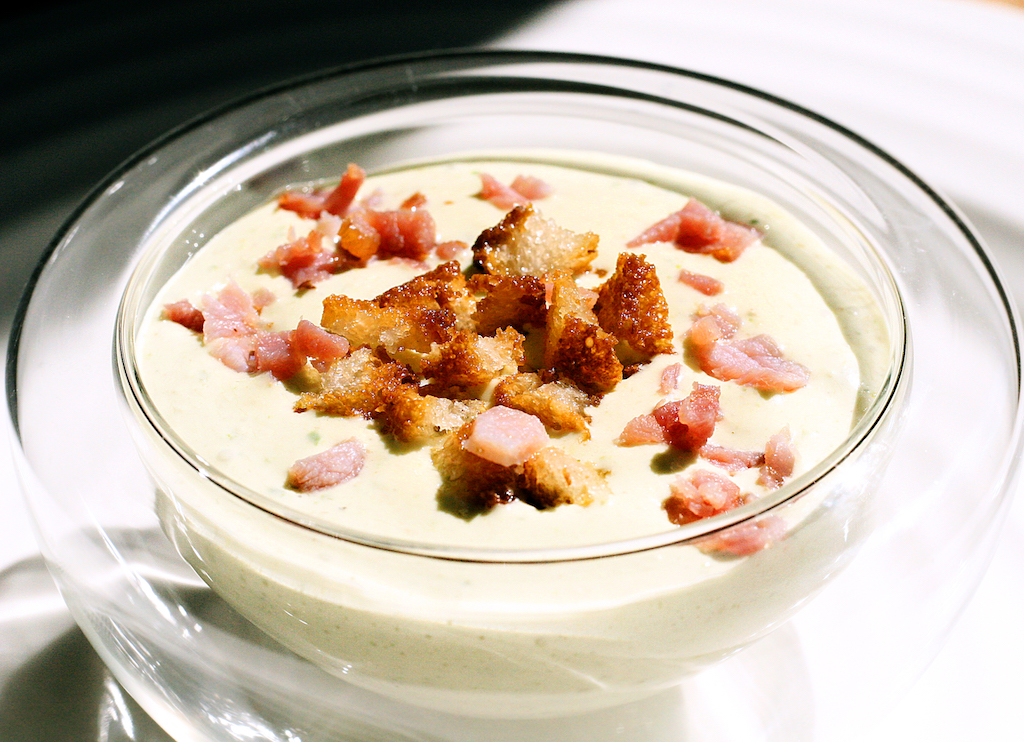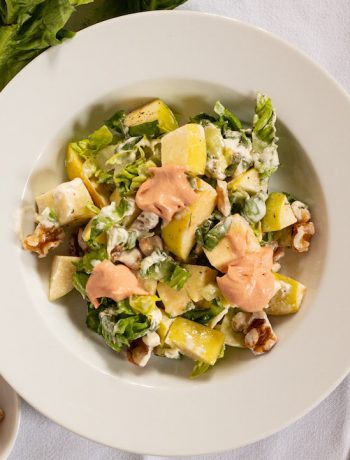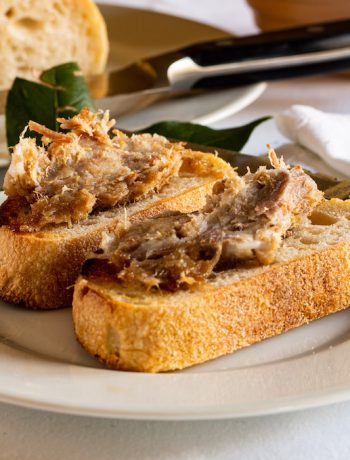I am not going to replicate Nigel’s excellent article on the origins of Caesar salad. This article is intended to give you introduction to the molecular technique of making espumas. The term itself, has a double meaning, in that the siphon, used for to make the foam, is also known as an espuma. We tend to think of culinary foams as a modernist thing. However, you don’t have to look far to realise that they have been around in the kitchen for rather a long time; think, whipped cream, meringues and mousses. In the modernist context foams are often used to add flavour to a dish, without bulk or substance. They are considered passé these days, by some, following their explosive entry onto the culinary scene about 15 years ago. Perhaps if we wait a bit longer, they will be considered retro, and enjoy a resurgence of popularity.
For this offering, courtesy of Cuisine R-Evolution you essentially blend all of the ingredients for a standard Caesar salad and place them in a siphon. The sciencey bit is the addition of the xanthan gum. Each granule works in the same way that a sponge does, absorbing water and swelling up. Because there are thousands of them in the small amount of gum that you have added, they work together to provide a stable structure to your foam, trapping the bubbles of gas, to give you a foam that doesn’t collapse into a watery puddle in the bowl.
If you don’t have a siphon, you can obtain a reasonable result using a stick blender with an ‘aerator’ blade, as long as you use the Xanthan gum.
So, passé or not, knock yourself out and impress your friends with this elegant but relatively simple dish that can be served as an amuse bouche or a light starter.
Caesar salad espuma
Ingredients
- 1 egg
- 1 clove of garlic
- 6 drops of tabasco sauce
- 1 tsp Dijon mustard
- 1 anchovy fillet
- 1 tsp capers
- 1 tsp bacon bits – I used home cured smoked streaky
- One and a half tbsp lemon juice
- 200ml vegetable oil
- 4 tsp grate parmesan
- 1 washed head of Romaine lettuce
- Salt and pepper
- Croutons
Instructions
Place the egg, garlic, tabasco, mustard, anchovy, capers, bacon bits and lemon juice into the blender and 'whizz.' With the blades still turning, slowly pour the oil in, in a thin continuous ribbon, in the same way you would for making mayonnaise. Then add the parmesan, xanthan gum and lettuce head, and blend until homogenous.
Strain through a sieve and pour into the chamber of your siphon. Load a single cartridge of N2O and set aside for 1 hour.
To serve, shake vigorously for about 10 seconds and serve in small glass bowls. Garnish with croutons and some more bacon bits.
Notes
The other classic dish that springs to mind for this treatment is prawn cocktail. Why not give it a go and get creative.







4 Comments
Shreyasi goenka
10/09/2019 at 5:13 pmHello, How much Xanthan Gum?
Nigel Eastmond
17/09/2019 at 5:30 amWe are working on it Andrew made this up as he went along. If I had to guess, I would say a teaspoon.
Nigel Eastmond
14/11/2019 at 2:22 pmI am struggling to answer this for you. Andrew is a bit out of the loop right now, and he just winged it. Probably a teaspoon.
David
16/12/2023 at 7:43 pmxanthan gum is usually 0.5-1% by weight depending on how thick you want. A little goes a long way so start with a lower amount and work up before you strain and charge in the whipper. I make a spinach and blue cheese espuma with similar ratios (i.e. 1 egg, 250 cc olive oil, juice from one lemon, 75 gm baby spinach, blue cheese to taste, sriracha and salt to taste) with 2 gm xanthan gum (approx 1/2 tsp).